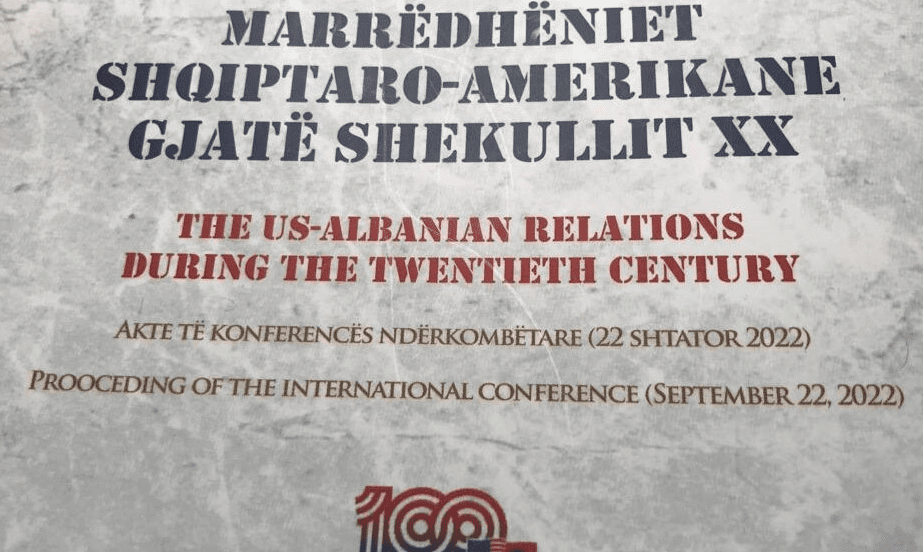Researchers from Albania and the United States address for the first time all periods of bilateral relations: from the establishment of diplomatic relations, their interruption during the communist regime, and up to the years of transition.
The authors believe that the history of Albanian-American relations holds many messages for the present days.
Diplomatic relations between Albania and the United States were established in late July 1922, while the publication by the Institute of History is the first comprehensive and professional book on Albanian-American relations over a century.
The studies by the 12 Albanian and American authors bring a series of new documents, findings, and theses, based on the archives of both countries as well as others.
The researchers have assessed from a historical perspective the strong links between Albania and the USA, the preferential alliance between them at the beginning of the 20th century, the interruption of diplomatic relations, and the deep isolation of Tirana during the communist regime.
The Director of the Institute of History, Dr. Afrim Krasniqi, states that Albanian-American relations are currently excellent, but some Albanian politicians mistakenly view them as personal relationships between leaders or specific parties or lobbying groups, disregarding the implementation of democratic principles that the USA often reminds Albania to meet.
“Albania should not build its relationship with the USA as personal relations between leaders, or between specific parties or lobbying groups, but as stable institutional relations. To achieve this, some of the democratic principles that come from the USA and which we desire and believe in must be implemented in Albania. Albania should have a more constructive approach to American criticism, suggestions, recommendations, and assistance in Albania, and we should seize the moment, so as not only to jeopardize these relations due to internal problems but also not to lose the American interest as a factor in the Balkans,” says Mr. Krasniqi.
The authors analyzed Albania’s extreme positions from self-isolation during communism to the declaration of the USA as a strategic ally, even becoming one of the two countries with the greatest support for the USA.
Afrim Krasniqi adds that during the transition period, Albania periodically showed a crisis of mistrust in relation to the USA, and political elites are always critical of Washington whenever the USA criticizes negative phenomena in Albania.
He further states that recent developments are trying to seek third parties and scenarios that weaken the American message and do not convey it to Albanian society.
Before we love the USA and use slogans, as our leaders do, citizens must feel, understand, touch, and accept American advice and role, which is currently not happening in Albania. Albanian politicians use and misuse the USA for their political needs, but they refuse every time the USA makes contributions related to the state and Albanian society,” says Mr. Krasniqi.
Historians have studied developments between the two countries since the USA recognized Albania as a state and used its positive veto in its favor after World War I. After World War II, Albania was the only country in Europe that refused diplomatic presence from the USA.
They assess that Albanians love the USA because of its democratic values, as a state that cares about Albania, shares experiences, learns from them, and benefits from assistance in strengthening democratic institutions.
They emphasize that relations between Washington and Tirana are being established under new conditions as Albania approaches EU membership. Mr. Krasniqi states that as Albania progresses towards the EU, its relations with Washington and Brussels need to be studied for the benefit of the future.
“In Albania, there is no public debate, no political debate, no institutional approach, no long-term strategy, and no document or informal paper that can analyze bilateral relations as well as relations with the European Union to see where Albania’s place is in the coming decades. The purpose of this publication with studies is to bring the need for this debate to these institutions. Because in Albania, there is also a lack of research structures for this point, the Institute of History decided to fill this void,” says Mr. Krasniqi.
The authors of the studies are Janush Bugajski, Bernd Fisher, Elidon Mëhilli, Afrim Krasniqi, Hamit Kaba, Beqir Meta, Ledia Dushku, Artan Hoxha, Edon Qesari, Valentina Duka, Pranvera Teli, Migena Leskoviku.
The book contains studies on the role of the Albanian diaspora in the USA and its structure, the role of Vatra Federation over the years, as well as key events when American interventions left traces in the history of Albania, which they believe should be written as part of a process and not as a separate and isolated island.
Therefore, the studies published in this book have reached a particular scientific level, with reference value, as they constitute the most comprehensive and integral publication on Albanian-American relations.








